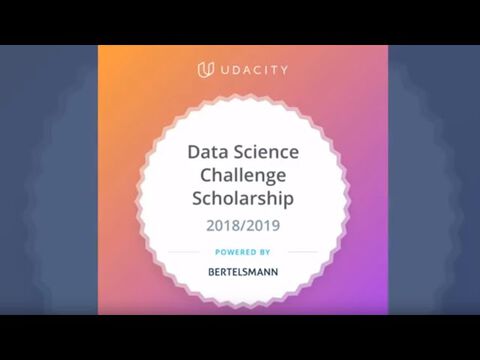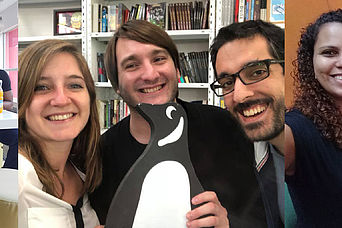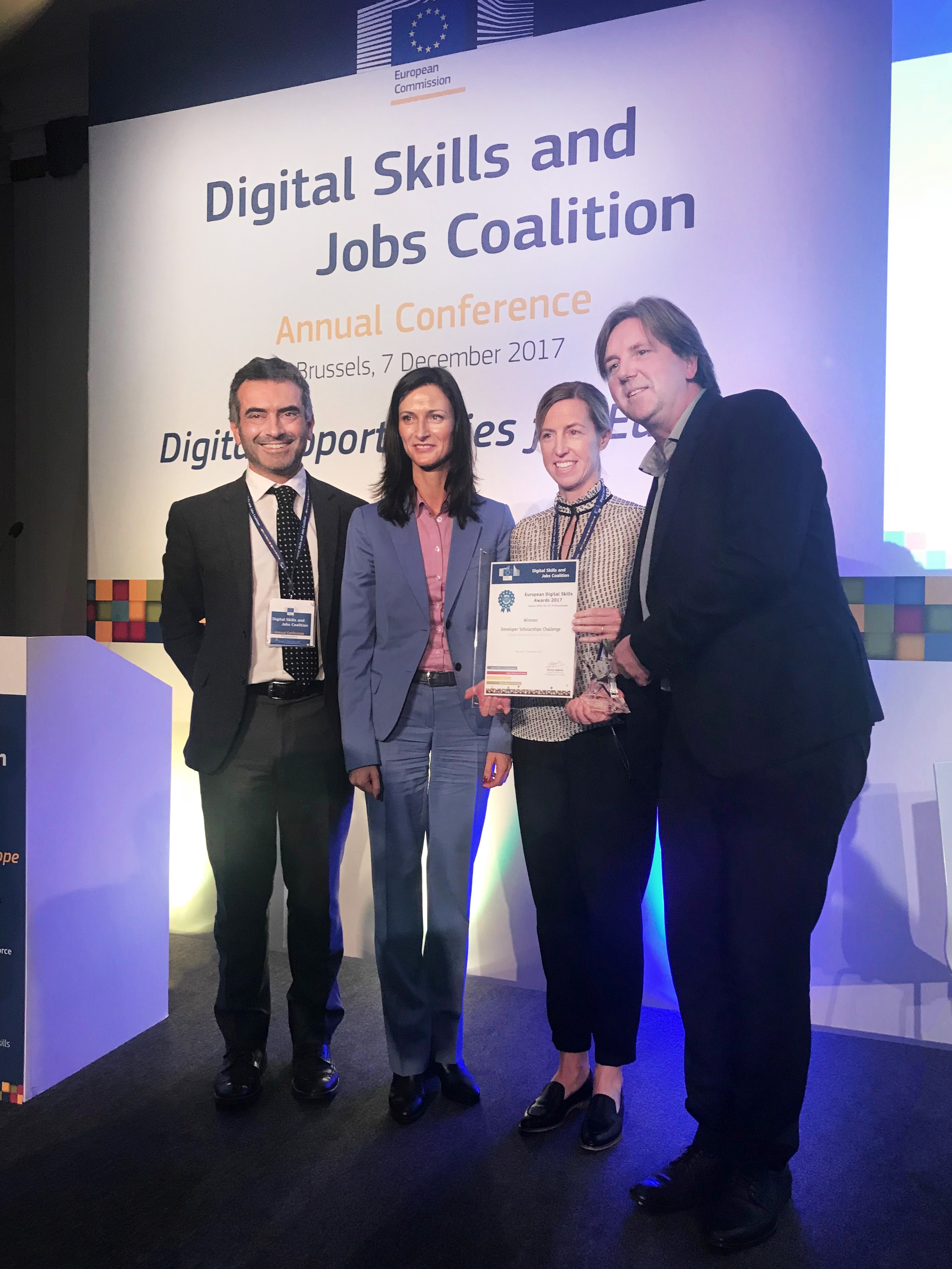The first phase of the Udacity Data Science Scholarship Program – the training initiative by Google, Bertelsmann, and Udacity – has been completed. And ultimately it didn’t just involve the analysis of large volumes of data; with a total of 15,000 participants worldwide, masses of data were also generated by the course itself. After three months of intensive work on statistical research methods, data visualization, and the examination of its usability, 36 percent of the participants have now successfully completed the program’s Challenge Course – a fifth of them are Bertelsmann employees around the globe. The top 1,500 graduates – including 361 Bertelsmann colleagues – will now go on to one of three full Udacity Nanodegree programs: Data Foundations, Business Analyst, or Data Analyst.

“A necessary skill of the future”
 “The Challenge Course completion rate speaks for the outstanding success of the scholarship initiative,” explains Bertelsmann's Chief Human Resources Officer Immanuel Hermreck. “I’m particularly pleased about the high participation rate among Bertelsmann employees’. This shows that data science is seen as a necessary skill of the future, not only from the company's perspective, but also from the employees'. I wish all the colleagues who will keep pursuing their data science studies with Udacity's Nanodegree program continued success.”
“The Challenge Course completion rate speaks for the outstanding success of the scholarship initiative,” explains Bertelsmann's Chief Human Resources Officer Immanuel Hermreck. “I’m particularly pleased about the high participation rate among Bertelsmann employees’. This shows that data science is seen as a necessary skill of the future, not only from the company's perspective, but also from the employees'. I wish all the colleagues who will keep pursuing their data science studies with Udacity's Nanodegree program continued success.”
“Data is an essential aspect in the digitalization of businesses,” says Niels Pothmann, Senior Manager Advanced Analytics at Arvato Systems. “Data is required for companies to be able to cope with current and future challenges and use them to create value that will give them a competitive edge. In this connection, Bertelsmann offers a very creative working atmosphere, lots of freedom, a multitude of projects and challenges, and global contacts.”
essential aspect in the digitalization of businesses,” says Niels Pothmann, Senior Manager Advanced Analytics at Arvato Systems. “Data is required for companies to be able to cope with current and future challenges and use them to create value that will give them a competitive edge. In this connection, Bertelsmann offers a very creative working atmosphere, lots of freedom, a multitude of projects and challenges, and global contacts.”
 Working with large amounts of data is a bit like detective work, says Peter Lipp, Senior Analytical Consultant, Direct Analytics at Bertelsmann Printing Group, describing the job of data analysis in workaday life, thereby highlighting the importance of data science experts in companies. “Instead of a magnifying glass, I use my computer and algorithms as my tools for searching for digital fingerprints and the data that people leave behind,” says Lipp, who has also augmented his expertise with the help of the Udacity Data Science Scholarship Program. “In the end, I put all the pieces of the puzzle together in order to find the best customer.”
Working with large amounts of data is a bit like detective work, says Peter Lipp, Senior Analytical Consultant, Direct Analytics at Bertelsmann Printing Group, describing the job of data analysis in workaday life, thereby highlighting the importance of data science experts in companies. “Instead of a magnifying glass, I use my computer and algorithms as my tools for searching for digital fingerprints and the data that people leave behind,” says Lipp, who has also augmented his expertise with the help of the Udacity Data Science Scholarship Program. “In the end, I put all the pieces of the puzzle together in order to find the best customer.”
Positive feedback from participants
For  some of the Bertelsmann employees who participated in the first phase of the Udacity Data Science Scholarship Program, the
some of the Bertelsmann employees who participated in the first phase of the Udacity Data Science Scholarship Program, the  topic of data analysis was new territory, for others it was directly linked to their daily work. Nevertheless, the feedback from the participants was positive down the line. “The course was a lot of fun,” says Alexandra Kraft, a journalist at the G+J magazine “Stern.” “It was the first time I had studied using an online platform, and one of the most important things I learned is how much I can achieve by being self-motivated. Barriers arise only in the mind. What I also really enjoyed was the interaction with the other students. I've made new friends all over the world,” she adds. Yatendra Singh, Head of Technology at DK India, says: “I was able to automate the processes that contribute to a project’s success based on the data I collected during the implementation phase.”
topic of data analysis was new territory, for others it was directly linked to their daily work. Nevertheless, the feedback from the participants was positive down the line. “The course was a lot of fun,” says Alexandra Kraft, a journalist at the G+J magazine “Stern.” “It was the first time I had studied using an online platform, and one of the most important things I learned is how much I can achieve by being self-motivated. Barriers arise only in the mind. What I also really enjoyed was the interaction with the other students. I've made new friends all over the world,” she adds. Yatendra Singh, Head of Technology at DK India, says: “I was able to automate the processes that contribute to a project’s success based on the data I collected during the implementation phase.”
During  the Challenge Course, the individual exercises gave rise to various projects in which the students were able to put the theoretical knowledge they had acquired into practice. For example, Peter Lipp and his team identified the countries of origin of more than 2,300 students and presented them as an attractive diagram. During a self-initiated hackathon, some 50 teams looked into the use of data in the health sector.
the Challenge Course, the individual exercises gave rise to various projects in which the students were able to put the theoretical knowledge they had acquired into practice. For example, Peter Lipp and his team identified the countries of origin of more than 2,300 students and presented them as an attractive diagram. During a self-initiated hackathon, some 50 teams looked into the use of data in the health sector.
Interaction on social media
 Most of the communication among the participants, who were spread around the globe, took place via social media. On Facebook one group had around 10,000 members. The aspiring data science experts exchanged information about the course content and assignments in more than 5,000 posts, 40,000 comments, and 160,000 reactions. About 3,000 participants on Facebook and Twitter used the “#poweredbybertelsmann” hashtag. In addition, around 1,000 meetings were held – both online and offline.
Most of the communication among the participants, who were spread around the globe, took place via social media. On Facebook one group had around 10,000 members. The aspiring data science experts exchanged information about the course content and assignments in more than 5,000 posts, 40,000 comments, and 160,000 reactions. About 3,000 participants on Facebook and Twitter used the “#poweredbybertelsmann” hashtag. In addition, around 1,000 meetings were held – both online and offline.
1,500 Challenge Course graduates start Nanodegree Programs
1,500 Udacity Data Science Scholarship Program participants will now go on to one of three Nanodegree programs. One of the scholarship holders is Hendrick Lange, Senior Director at Bertelsmann Corporate Communications at the Corporate Center in Gütersloh. “One major challenge in marketing and communications is the development of evidence-based strategies,” he says, explaining his rationale for participating in the scholarship initiative. “By taking the nanodegree program, I can further optimize the necessary data evaluations and derivations of concrete measures.”
Data Science Scholarship Program participants will now go on to one of three Nanodegree programs. One of the scholarship holders is Hendrick Lange, Senior Director at Bertelsmann Corporate Communications at the Corporate Center in Gütersloh. “One major challenge in marketing and communications is the development of evidence-based strategies,” he says, explaining his rationale for participating in the scholarship initiative. “By taking the nanodegree program, I can further optimize the necessary data evaluations and derivations of concrete measures.”
 Depending on which of the three Nanodegree programs the participants go on to complete, the online courses run over a period of three to six months. The Data Foundations nanodegree focuses on the processing, analysis, and visualization of data using programs such as Microsoft Excel, SQL and Tableau. Business Analyst nanodegree candidates learn how to create prediction models, and Data Analyst nanodegree students learn how to use programming languages such as Python to develop data-driven solutions.
Depending on which of the three Nanodegree programs the participants go on to complete, the online courses run over a period of three to six months. The Data Foundations nanodegree focuses on the processing, analysis, and visualization of data using programs such as Microsoft Excel, SQL and Tableau. Business Analyst nanodegree candidates learn how to create prediction models, and Data Analyst nanodegree students learn how to use programming languages such as Python to develop data-driven solutions.
Upload the Challenge Course into peoplenet learning history now
All Challenge Course graduates who wish to upload information about the completed course to their peoplenet learning history can follow the standard procedure for external learning activities and contact their local peoplenet Ambassador. You can find your contact person here.
(benet)


